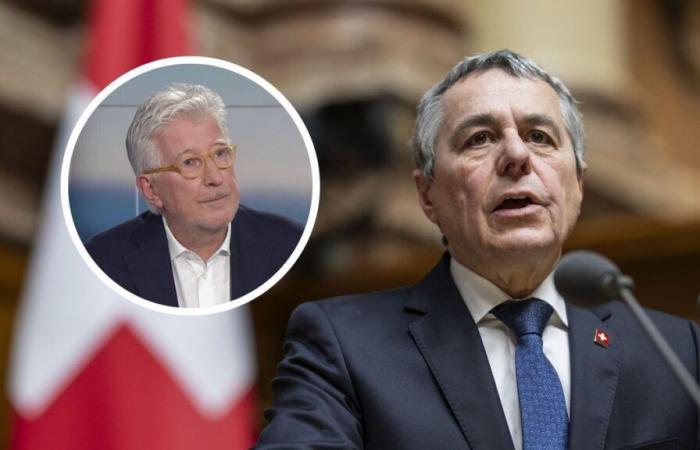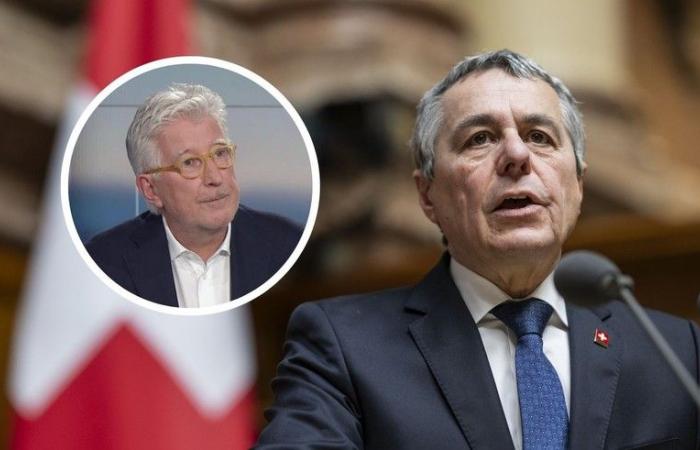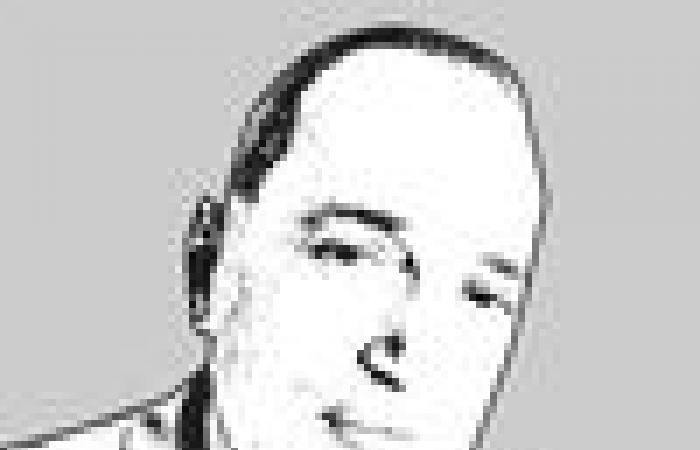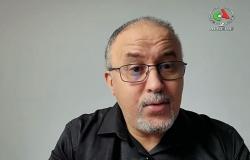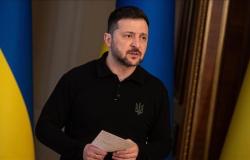
Ignazio Cassis, the man who carries the Swiss-EU framework agreement. Bern, March 17, 2025. Medallion: Pascal Mahon, professor at the University of Neuchâtel.Image: KEYSTONE
While the decision of the Federal Council not to submit the Swiss-EU framework agreement to the agreement of the people and the cantons arouses strong controversies, Pascal Mahon, professor of constitutional law at the University of Neuchâtel, explains the current and historical mechanics of the referendum, drawn, or not, for international treaties.
08.05.2025, 19:0708.05.2025, 21:48

Follow me
By deciding to submit the framework agreement concluded between Switzerland and the European Union to the possibility of the optional referendum (majority of the people) and not to the compulsory referendum (majority of the people and the cantons), the Federal Council and its Minister of Foreign Affairs Ignazio Cassis sowed anger in the sovereignist camp.
In a podcast dated May 6, the former president of the UDC Vaud, Kevin Grangier, Romand Coordinator of Pro Switzerland, the pressure group from the ex-association for an independent and neutral Switzerland, says, speaking of the counters of the Cassis line: “They murdered Switzerland”. Really? watson Speed these questions with Pascal Mahon, professor of constitutional law at the University of Neuchâtel.
By submitting the framework agreement between Switzerland and the European Union to the optional referendum, in other words by the simple majority of the people in the event of a vote, the Federal Council, according to the line of Ignazio Cassis, betrays the Constitution?
Pascal Mahon: No. In our constitutional system, only international treaties concluded for a support for a supranational community such as the European Union or a collective defense organization, of NATO type, must be subject to the compulsory referendum, that is to say to the double majority of the people and the cantons. But, in the history of Switzerland, we had three cases of a compulsory referendum called extraordinary, called “sui generis” in more technical language. The Federal Council spontaneously submitted to the compulsory referendum requiring the double majority.
What are these cases?
“The first of the three cases was the vote in 1920 for membership of the League of Nations, the ancestor of the United Nations located in Geneva. The people and the cantons say “yes” “”
It should be noted that at the time did not yet exist in the Swiss Constitution the system providing for the scenarios of the compulsory referendum in terms of international treaties, whose trigger is automatic. The optional referendum, and not compulsory, worth for international treaties for more than 15 years, was introduced into the Constitution the following year, in 1921. In 1920, the Federal Council therefore proposed a compulsory referendum of an extra-constitutional nature, if we want.
What was the second case of compulsory extra-constitutional referendum?
It was, in 1972, the free trade agreement with the European Economic Community, which later became the European Union. The Federal Council, followed by the Parliament, estimated that this agreement, which enabled the entry of industrial products and Swiss processed agricultural products into the European market, was so important and in a way revolutionary at that time, that it required a double-major vote.
On the EEE, an extraordinary compulsory referendum
And what is the third case of compulsory extra-constitutional referendum?
This is the entry into the European Economic Area (EEE), rejected by the people and the cantons in 1992. The Federal Council was not required to submit this object to the compulsory referendum, the EEA not being a supranational organization like the EEC which has become the EU, but it estimated that the consequences of membership were sufficiently important, in particular in terms of dispute resolution, to justify a double majority. Important clarification: unlike the two other cases mentioned, the compulsory referendum already existed, this time, in the Constitution.
When was the compulsory referendum in matters of international treaties been introduced into the Constitution?
In 1977. That year was introduced into the Constitution a new system of referendum on international treaties, which includes two types of treaties subject to the compulsory referendum: membership of a supranational community or a collective defense organization, as seen above.
“The first vote on the membership of the UN, in 1986, was thus subject to the compulsory referendum, to the double majority, therefore, because the UN was considered as a collective security organization”
When the Swiss agreed to enter the UN in 2002, it was following a popular initiative, requiring, as we know, the double majority. Besides this first category of treaties, we find the international treaties subject to the optional referendum.
What do they have of different?
These are those who suppose an adaptation of Swiss law at the legislative level, but not of the Federal Constitution, those which are unplanted and of an indefinite duration and those which lead to adhesion to an international organization. There is a third category, international agreements which are not subject to any referendum while requiring Deparlement approval (these are those which do not enter any of the two previous categories). Finally, certain treaties, deemed to be less important, are at the discretion of the Federal Council alone, when the legal basis already exists in Swiss law, for example.
“So this is all four categories of treaties”
Two important chord blocks regulating Switzerland’s relations with the European Union, bilateral I and bilateral II including Schengen/Dublin (free-circulation of people and asylum), accepted in 2000 and 2005 respectively in voting, were submitted to the optional referendum requiring the only majority of the people and not to the compulsory referendum. For what?
On these occasions, the Federal Council considered that these treaties or agreements did not fall under the compulsory referendum, since they did not bring Switzerland into a supranational organization. But he nevertheless asked himself the question of subjecting them to what I first called the compulsory extraordinary or extra-constitutional referendum, as for the objects of 1920, 1972 and 1992.
And then?
The Federal Council estimated that this was not justified and the Parliament followed it. But the question arose at the time and we can also ask ourselves for this framework agreement, which the Federal Council finally decided to submit to the optional referendum alone. That said, we are clearly not today, with the framework agreement, in a case where the Constitution obliges the compulsory referendum.
“Those who say that the Federal Council is twisting the law want the rejection of the framework agreement”
They know that the double majority would probably sign his death. Recall that Schengen/Dublin, accepted by a simple majority, was approved at 56% by the people, but rejected by a majority of cantons.
Are the proponents of the compulsory referendum right when they say that the double majority for the framework agreement would be more democratic?
No, not necessarily. Let me say why. There is a whole political movement in Switzerland which would like us to extend the compulsory referendum to all international treaties. This request is always justified by the argument that it would be more democratic. However, is the compulsory referendum really more democratic than the optional referendum, knowing that the citizens of small cantons sometimes have up to 50 times more weight in a double majority vote than the citizens of other cantons, a vote of Appenzell Rhodes-Interiori thus weighing approximately 50 times more than a vote of the canton of Zurich, a vote of Uri 40 times more?
What do you deduce?
“I would say that the compulsory majority referendum is a strengthening of federalism, but that it is not a strengthening of democracy”
I would add that, in the case of the framework agreement, the question of whether one is rather within the perimeter of the optional referendum or in the spirit of the compulsory extraordinary referendum can be discussed, but to decide, it would be necessary to know precisely what the agreement contains. Now we don’t know it for the time being and this is a criticism that can be sent to the Federal Council.
News in Switzerland is here
Show all articles

